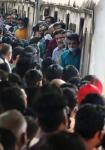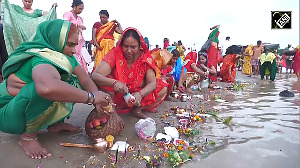Two Indian doctors, who devised a novel programme for bringing down infant mortality rate in rural areas of South Asia, have been named heroes of Global Health by the Time magazine.
Abhay and Rani Bang, founders of the Society for Education, Action and Research in Community Health, are among 18 heroes of Global Health named by the magazine for their work in solving health problems in the developing world.
The health programme, adopted in India, Bangladesh, Nepal, Pakistan and parts of Africa, cut child mortality in half for a cost of only $2.64 for each child saved, the magazine said in a citation.
The other heroes are from Bolivia, China, Cambodia, Congo, Honduras, Kenya, Nepal, Mozambique, Myanmar, Nigeria, Swaziland, Britain and the United States.
"We were looking for people who had pioneered innovative ways to improve the health of poor people around the world," Time Science Editor Philip Elmer-DeWitt said.
"To our surprise, wherever we looked, we found them -- from an ex-motorbike racer who dispatched hundreds of sidecar-equipped motorcycles across Africa for use as mini-ambulances to a Thai economist who championed condom use among Bangkok sex workers and headed off what could have been a devastating outbreak of HIV/AIDS.
"The great thing about these projects is that they can be replicated and scaled up-and inspire even more pioneering approaches to improving health worldwide," he added.
According to the magazine, Abhay and Rani Bang decided to work on high child-mortality rate in the developing world, a subject the medical community had long abandoned, after a baby boy died before them without treatment in Maharashtra's rural Gadchiroli district.
They then identified 18 causes of newborn death, from the obvious, like malnutrition, to the surprising, like the habit of expectant mothers of starving themselves and their unborn child for an easier birth, it said.
The duo found no problems that couldn't be treated by a health worker with rudimentary skills, some infant sleeping bags and an abacus on which to record every 10 heartbeats.
They got a seamstress to stitch the sleeping bags and a carpenter to make the abacuses, and they drew up a health training programme that they taught to a newly assembled corps of village health workers.
In 1999, they published the results of their efforts in the Lancet. They had cut child mortality in half -- a figure that would fall to a quarter by 2003 -- for a cost of $2.64 for each child saved.
The programme is now being adopted across India and in Nepal, Bangladesh, Pakistan and parts of Africa.
They also identified alcohol abuse as another big issue and began addiction treatment.
And given that half their patients were from Gond tribe and wary of city hospitals, they set up a medical centre named Shodhagram outside Gadchiroli that resembles a village.
The centre has separate huts housing the lab, surgery, pharmacy, wards, library and even a shrine to the Gond goddess Danteshwari, the magazine said.






